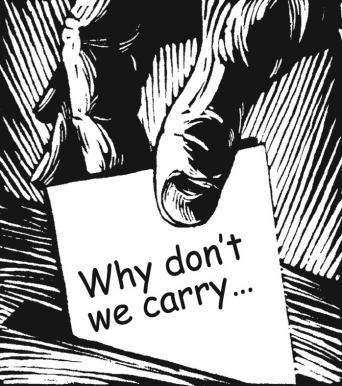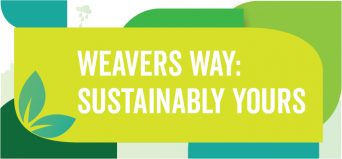
You Suggest, We Think About It
Mr. McGuire: I want to say one word to you. Just one word.
Benjamin: Yes, sir.
Mr. McGuire: Are you listening?
Benjamin: Yes, I am.
Mr. McGuire: Plastics.
Benjamin: Exactly how do you mean?
Mr. McGuire: There’s a great future in plastics. Think about it. Will you think about it?
Benjamin: Yes I will.
It’s great to hear from members and shoppers who share our values, and we received several letters about plastic after Shuttle Editor Mary Sweeten’s column last month about plastic straws. Elisabeth Nickles and Lynn Mather, whose letters are here and here, both believe the Co-op can and should do better on single-use plastic and other packaging. And Cecilia Dougherty wrote:
“I am wondering why we let Trader Joe’s beat us to switching to compostable plastic bags? Even though I try not to use bags whenever possible and reuse them, I still end up with too many. Cellophane was the original plastic and is made from plants. It would be great to have bags that break down when they are no longer useful and that aren’t made of fossil fuels. I read that Pennsylvania fracked gas will be sent to Scotland to make plastic. What a waste. We can do better.”
Plastic is way more present than just in packaging. In March, National Geographic informed us that of the 79,000 tons of plastic trash that makes up the Great Pacific Garbage Patch, almost half is abandoned plastic fishing nets. Sit in your car and you are surrounded by plastic — your car likely contains over 400 pounds of plastic, and the amount is increasing as technology creates new plastic materials that can replace heavier, and more expensive, non-plastic materials. Walk into a Home Depot and whatever tool or household supply you look at, it likely contains plastic. Look at your computer, your air-conditioner, your lawn mower, your clothes, your TV. Take yourself through a typical day and think about how often your body is in contact with plastic. From the moment most of us wake up, we start with a plastic toothbrush, put on clothes made with plastic, touch our phone’s plastic covered screen and case. There is no escaping it. This is why replacing plastic requires a major paradigm shift, but the first step is consciousness of the depth of the problem.
Regarding the compostable produce bags, I’ll have to get to TJ’s to have a look at the bags, but if they are what I think they are, they are compostable or biodegradable more in theory than in practice. Most compostable plastic is “bioplastic,” i.e., made from plants, often corn. Whether plastic made from plants is better than plastic made from petroleum is a worthwhile conversation on the production side, but on the disposal side, there are major problems with bioplastic. First, it will not compost in your backyard compost pile. Bioplastics require industrial composters that heat material to 140 degrees, have controlled air flow and active timed turning and sometimes require added digestive enzymes. Commercial composting facilities of this kind are uncommon, and there aren’t any in our area. Second, even where such facilities exist, bioplastics require 60- to 90-day cycles to actually break down, and few businesses can afford to tie up their equipment for that length of time.
It seems to me that claiming a plastic material is compostable is a form of greenwashing or, to use a more fashionable term, fake news.
All this said, we are left with figuring out the least damaging of the available products to run our retail food business. So we choose produce bags made from 100 percent post-consumer recycled plastic resin, we choose prepared food and deli containers that contain recycled plastic, we use reusable pallet wraps at our warehouse, and we choose disposable forks and spoons made out of 70 percent bioplastic and 30 percent talc, with the idea that although bioplastic is still a waste problem, at least its production seems less bad than petroleum-derived plastic. We also offer cellophane bags (ours are made from cottonwood trees, according to the supplier) and paper bags in our bulk departments.
Typical of Weavers Way’s engaged and activist membership, we do have a Plastic Reduction Task Force. Formed last spring, it’s a subcommittee of the Weavers Way Environment Committee. Its goal is to investigate waste issues associated with the full life cycle of plastics, raise awareness about the effects of unregulated plastic production and advise the Co-op on ways to reduce single-use plastics. They are planning several workshops for next year. Contact them at prtf@weaversway.coop if you want to get involved.
Regarding straws, there is no doubt there is a problem, and if eliminating plastic straws is a step toward raising consciousness about unnecessary single-use plastic utensils and the trouble they cause, then their value as a sustainability icon has merit and Weavers Way should eliminate them and explain why to shoppers. (We’ll have to figure out what to do with the 20,000 plastic straws left in our warehouse; maybe we could fill them with dirt and use them as a building material.)
Anyway, thanks for writing, and here are the regular suggestions and responses. As usual, they may have been edited for brevity, clarity and/or comedy. In addition, no idea, concept, issue, remark, phrase, description of event, word or word string should be taken seriously. This also applies to the previous sentence.
suggestions and responses
s: “Meredith Dairy cheese is fantastic, I even use the liquid for cooking greens. Co-op has good price too.”
r: (Norman) Right now we stock it in our Mt. Airy and Chestnut Hill stores. Look for the jars of feta from New Zealand. From Meredith’s website: “. . . Made in a socially and environmentally responsible business; from milk produced according to leading standards of environmental management and animal husbandry.”
s: “Please sell smaller (1/2) bunches of herbs like dill, parsley and cilantro. I never need the huge bunch, they don’t freeze well and I waste so much.”
r: (Jean MA) Ask a produce staffer to divide one for you.
s: “Wild Flour cornbread is amazing.”
r: (Norman) Good to hear. A simple thing like cornbread turned into a major project for us when our supplier, Personal Chef, stopped making its popular cornbread. We tried making it ourselves and also asked a few of our other bakery suppliers to take a shot. For a variety of reasons, we weren’t happy with any of the resulting cornbread. Meanwhile, Jenna, our new Mt. Airy bakery buyer, had been looking around for some new products and found another local baker, Wild Flour, founded in 2003 in South Philadelphia and currently in Holmesburg. We asked them if they would make us some cornbread, which they did, and shoppers seem to like it. We currently carry Wild Flour products in Mt. Airy and Chestnut Hill and we’ll see if we can get them into Ambler.

